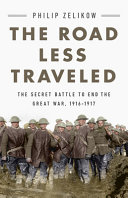2018 School Spending Survey Report
The Road Less Traveled: The Secret Battle to End the Great War, 1916–1917
COPY ISBN
VERDICT This thought-provoking history is based on vast primary sources, and while the narrative sometimes bogs down in excessive detail, Zelikow’s sharp account brings World War I into focus and raises a number of fascinating “what if” scenarios. Recommended for all extensive history collections.
RELATED
ALREADY A SUBSCRIBER? LOG IN
We are currently offering this content for free. Sign up now to activate your personal profile, where you can save articles for future viewing




Comment Policy:
Comment should not be empty !!!